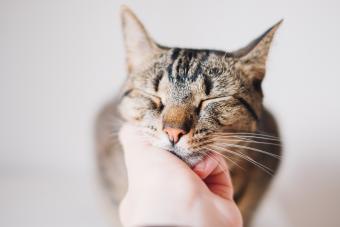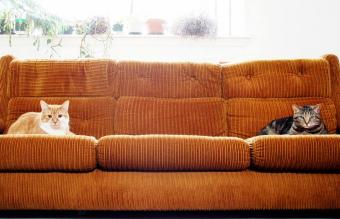
Cats have an excellent sense of smell, taste, and hearing. They can see in near-darkness and can hear high-frequency sounds that are inaudible to humans. But what about their memory? If your cat is exhibiting some odd behavior, could a whiff of the wrong scent or hearing a certain sound capture their attention?
What Do Cats Remember?

Cats have a very good memory. They can remember your scent, your face, and even your name. Cats have an amazing sense of smell, which helps them to identify their owners and other cats, even if they haven't seen each other for weeks or months. Their sense of hearing and taste can also help trigger certain memories.
Your cat remembers the physical location of objects - they have spatial memory - and they have both short- and long-term memory. When you come home after you've been gone on vacation for two weeks, you probably noticed your cat reacted to your return. They remember you, but no one is sure how long they can retain memories.
Cat Short-Term Versus Long-Term Memory
Cats have both short-term and long-term memories, which allow them to store and recall information based on their needs and experiences. Short-term memory only lasts for about 30 seconds or so, and cats rely on it to make quick decisions and solve problems (just like us).
Studies have found that cats can remember where they've hidden their toys or where they've seen their owners place treats, even after short periods of time. Your cat's long-term memory is impressive. Cats have been shown to remember individuals, places, and experiences for extended periods, sometimes even years.
However, it's important to note that feline memory is selective. Cats tend to remember things that are directly relevant to their survival and well-being, such as the location of their food and the scent of their owner. This selective memory is a crucial evolutionary adaptation that allows them to prioritize essential information.
Do Cats Remember Their Owners?

Yes, cats do remember their owners. Cats form strong bonds with their human caregivers and can recognize them based on various cues, such as scent, voice, and appearance. Although they are often seen as independent and aloof, your cat is paying more attention to what you're doing than you may think.
Your cat likely doesn't hold a grudge, but they can become irritated with their owners.
Do Cats Recall Abuse?
If you adopt a cat who has been abused in the past, you may notice signs of irritability and reluctance to be near you. Although cats aren't well-known to recall minor bouts of punishment, the effects of severe abuse could last a lifetime.
You may also notice your cat behaving normally, and suddenly seem to turn into a completely different cat. Triggers could include certain scents, sights, or audible sounds. Similar to humans, when a cat is triggered, their behavior can be out of the ordinary. Building a strong bond with your rescue cat can help them overcome trauma and abuse in their past.
Do Cats Remember Their Littermates?

Cats may retain some memories of their early life experiences and interactions with their siblings. If littermates are reunited after a period of separation, they may display curiosity and interest in each other, but it's difficult to determine if this is a result of memory or simply a reaction to a novel encounter with another cat.
The strong bonds formed in their early life can fade over time, and changes in scent can make it challenging for cats to recognize their siblings based on scent alone. No one is sure, but it's likely that cats don't really remember their littermates.
Do Cats Remember Other Cats?
Cats can remember and recognize other cats, particularly those they have shared a living space with or have had frequent interactions with. They can recognize other cats based on various cues, such as scent, appearance, and vocalizations. Cats use these cues to identify familiar cats and distinguish them from strangers.
Cats are social animals, and their relationships with other cats can be complex, ranging from companionship and play to rivalry and territorial disputes. They can form strong social bonds with other cats. This is especially true if they grew up together or have lived together for an extended period.
Do Cats Remember How to Find Home?

Cats have an incredible ability to find their way back home, a phenomenon known as homing behavior. Although the exact mechanisms are not fully understood, researchers believe that cats use a combination of innate and learned skills to navigate their environment. Some of these skills include:
- Spatial memory: Cats can remember specific landmarks and features in their environment, helping them retrace their steps if they need to find their way back home.
- Sense of smell: Cats have a keen sense of smell and can use scent trails to guide them back to familiar territory. They may recognize the smell of their home, their owner, or other animals in the area.
- Earth's magnetic field: Some studies suggest that cats, like birds and other animals, may be able to sense the Earth's magnetic field. This sense may help them navigate and orient themselves in their environment.
- Sound cues: Cats have excellent hearing and can use sounds to help locate familiar places. They may recognize the sounds of cars, birds, or other animals in their neighborhood.
- Visual cues: Cats have good vision and may use visual landmarks, such as trees or buildings, to help them find their way back home.
- Social cues: Cats can be highly social animals and may follow other cats or animals in their neighborhood, who may lead them back to familiar territory.
Do Senior Cats Lose Their Memory?
As with humans, aging affects cognitive function in cats. Senior cats can experience cognitive decline, which may manifest as memory loss or confusion. This condition, known as feline cognitive dysfunction (FCD), and it is similar to dementia or Alzheimer's disease in humans.
Symptoms of FCD in cats can include disorientation, changes in sleep patterns, increased vocalization, reduced grooming, and alterations in their interactions with humans or other animals. While FCD is not reversible, there are measures you can take to slow down its progression and improve the quality of life for senior cats.
Your Cat's Selective Memory
Cats do indeed have good memory, with their selective memory playing an essential role in their survival and well-being. They may not remember everything that you have done every day, but they remember the important things. However, senior cats can experience cognitive decline and memory loss due to age-related factors. Just know, your kitty remembers you and loves you.







